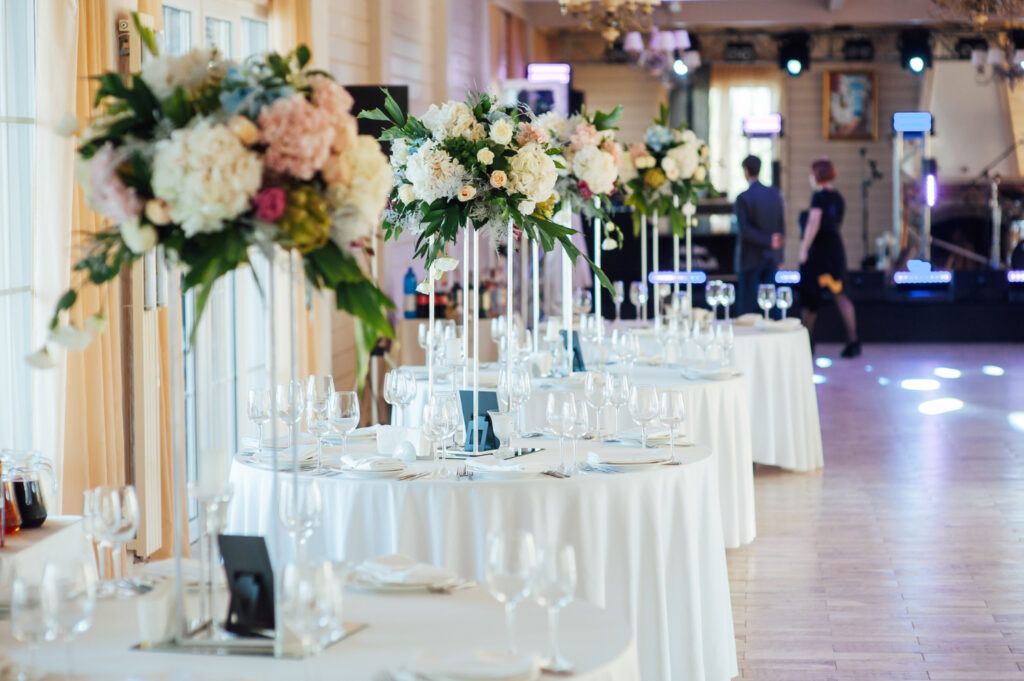Choosing the right wedding vendors is akin to setting the stage for a flawless performance. The right ensemble can transform your special day into a seamless celebration of love, while the wrong choices could turn it into a logistical nightmare.
This blog post is for those embarking on their wedding planning adventure, providing essential tips to ensure your vendor selection process is as smooth as possible.
From understanding the role of wedding vendors to practical steps such as budgeting and contract negotiation, we’ll guide you through this crucial aspect of wedding planning. Read on to discover how you can make informed decisions that pave the way for your dream wedding.
Table of Contents
ToggleWhat Are Wedding Vendors?
Wedding vendors are the talented professionals who bring your wedding vision to life. They provide the essential services and products that make your big day memorable, from the food and flowers to the music and lighting.

Typically, wedding vendors include caterers, florists, photographers, videographers, DJs, planners, and more. Each vendor plays a unique role in creating an unforgettable day tailored to your style and preferences. Understanding their roles and responsibilities will help you prioritize your needs and communicate effectively with them.
Why Choosing the Right Vendors Matters
Selecting the right vendors is crucial because their services directly impact the quality and flow of your wedding day. Good vendors can elevate your celebration by ensuring everything runs smoothly and seamlessly.
On the other hand, poor vendor choices can lead to issues like delays, subpar service, and unmet expectations. By choosing reputable and experienced vendors, you reduce the risk of complications and enhance the overall experience for you and your guests.
Tip 1: Know Your Budget
Budgeting is the foundation of successful wedding planning. Setting a clear budget before approaching vendors will help you make informed decisions and prevent overspending.
To create a balanced budget, list all essential elements of your wedding, including venue, catering, attire, and entertainment. Allocate funds to each category based on priority and flexibility. Remember to leave some room for unexpected expenses or upgrades you might want as plans evolve.

Tip 2: Research and Recommendations
Thorough research is vital when searching for potential vendors. Begin by asking friends, family, and online communities for recommendations. Their firsthand experiences can provide valuable insights into the reliability and quality of various vendors.
Additionally, review portfolios and past work samples to assess each vendor’s style and capabilities. Online reviews and testimonials can also offer a glimpse into their professionalism and client satisfaction. The more information you gather, the better equipped you’ll be to choose vendors that align with your vision.
Tip 3: Prioritize Your Needs
Identifying and prioritizing your must-haves versus nice-to-haves is a crucial step in vendor selection. Start by listing the elements that are most important to you and your partner, whether it’s a specific floral arrangement or a particular style of photography.
Aligning vendor choices with personal priorities ensures that you invest in areas that hold the most significance. Communicate these priorities clearly to potential vendors, and choose those who can accommodate your preferences without compromising on quality.
Tip 4: Meet Vendors in Person
Meeting vendors in person offers valuable insights into their compatibility with your vision and personality. These meetings allow you to gauge their professionalism, communication skills, and enthusiasm for your wedding.
Prepare a list of key questions to ask during these meetings, such as their experience, availability, and approach to handling challenges. By assessing their responses and demeanor, you can determine if they’re a good fit for your team of wedding collaborators.

Tip 5: Check References and Reviews
Speaking with past clients and reviewing testimonials is essential for evaluating a vendor’s reputation. Reach out to references provided by the vendor to gain an understanding of their work ethic, reliability, and ability to meet expectations.
When reading online reviews, pay attention to recurring themes or issues, both positive and negative. This information will help you make an informed decision and choose vendors who consistently deliver exceptional service.
Tip 6: Understand Contracts Thoroughly
Contracts are the backbone of any vendor relationship. It’s essential to understand the terms and conditions before signing. Look for critical elements such as payment schedules, cancellation policies, and contingencies for unforeseen circumstances.
Don’t hesitate to negotiate terms or seek clarification on any ambiguous language. Ensure that all agreements are detailed and transparent, leaving no room for misunderstandings or disputes down the line.
Tip 7: Ensure Vendor Compatibility
Vendor compatibility goes beyond skill and experience; it involves aligning personalities and working styles. Building a positive rapport with your vendors fosters a collaborative environment and enhances the planning process.
During initial interactions, assess their willingness to listen, adapt, and contribute creatively to your vision. Compatibility ensures that your vendors understand your unique preferences and are committed to bringing them to life.
Tip 8: Be Clear About Expectations and Vision
Effective communication is key to a successful vendor relationship. Clearly articulate your vision, expectations, and any specific details that matter to you. Providing visual references, such as mood boards or Pinterest pins, can help convey your ideas more effectively.
By establishing open lines of communication, you empower your vendors to deliver results that align with your vision. Regular check-ins and updates will keep everyone on the same page and address any potential concerns early on.
Tip 9: Be Open but Trust Your Instincts
While it’s essential to remain open to vendor suggestions and expertise, trusting your instincts should not be overlooked. Your intuition can guide you in making decisions that feel right for you and your wedding.
If something doesn’t sit well with you, don’t hesitate to voice your concerns or explore other options. Balancing openness with trust in your gut feelings can lead to vendor choices that resonate with your values and aspirations.
Conclusion
Choosing the right wedding vendors is a rewarding process that requires time, research, and careful consideration. By following these tips and guidelines, you can confidently select vendors who will contribute to a memorable and seamless wedding day.
For more personalized assistance, visit the Wezoree website and explore their extensive network of top-tier wedding vendors ready to make your dream wedding a reality. Remember, your wedding is a reflection of your love story, and the right team will bring that story to life in ways beyond your imagination.
FAQs
How far in advance should I book my wedding vendors?
Booking vendors at least 9-12 months before your wedding date is advisable to secure your preferred choices.
What should I do if a vendor doesn’t meet my expectations?
Communicate your concerns openly and work collaboratively to find a solution. Most vendors are eager to resolve issues and ensure your satisfaction.
How do I handle vendor cancellations or changes?
Ensure your contracts include contingency plans. If a vendor cancels, seek replacements promptly using your network and online resources.
Can I negotiate prices with wedding vendors?
Yes, negotiating is common. Approach it respectfully and consider trading services or adjusting package details to reach an agreement.

